Can octopus breathe air? Yes. They can, for some extent.
If you’ve watched “Finding Dori,” you have met “Hank,” the octopus Dori meets in the “Jewel of Morro Bay, California.” That well-meaning creature could walk outside of water and think wise like a pro, and we thought that’s just fiction until we found the truth.
By reading this article, you will learn how octopus breathe air, crawl on land, for how long, and many other interesting facts. So, be ready to get amazed.
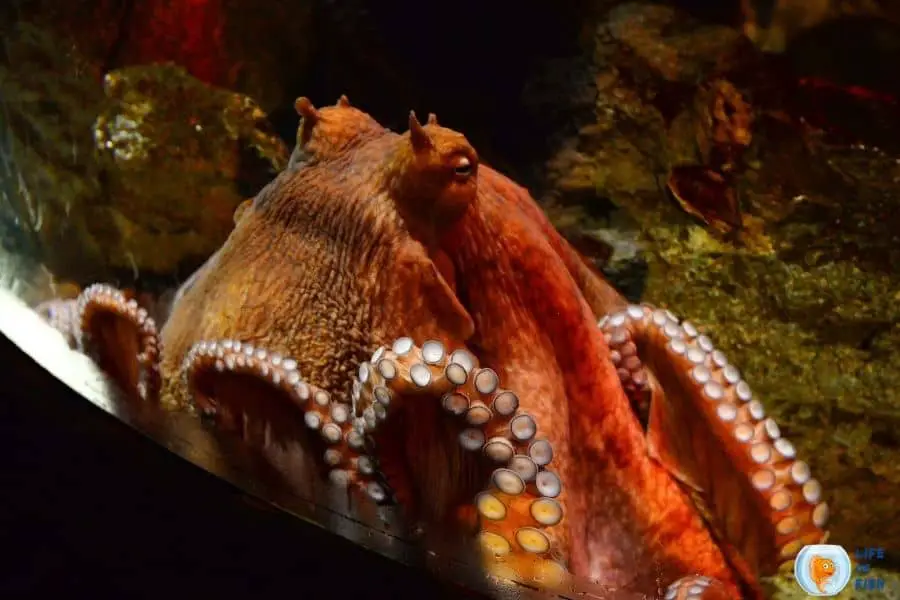
How does the octopus breathe air/oxygen?
Jump To
- 1 How does the octopus breathe air/oxygen?
- 2 How long can an octopus survive out of water?
- 3 Can octopus live without water?
- 4 Can octopus crawl on land?
- 5 Can octopuses walk on land?
- 6 Can octopuses feel pain?
- 7 Can an octopus bite your finger off?
- 8 Can octopuses eat humans?
- 9 Is octopus intelligent?
- 10 Are octopuses poisonous to humans?
- 11 Is it safe to touch an octopus?
- 12 Related Questions
- 13 Conclusion
Octopuses breathe air (oxygen) through their gills.
They pass currents of water through their gills to absorb oxygen from water, pulsing their mantle in and out and then exhale through a tube called a siphon.
These octopus gills collapse on land because of the lack of buoyancy. Therefore they actually can not breathe out of water.
How long can an octopus survive out of water?
Many octopus species can survive out of water for few minutes until their skin stays moist.
When their skin has moisture, they can absorb oxygen through their skin through passive diffusion.
Octopus gills don’t work once they are out of water because the gills collapse when they are not in the water.
When these creatures get dried while staying out of the water, they die as oxygen absorption stops. So, it is a gamble of life in search of food.
Can octopus live without water?
Octopuses can not live without water.
Although the octopi near coastal regions crawl out of the water and stay out of water for at least several minutes, they do that for searching for food.
They never stay outside water for long and transfer from one tidal pool to another tidal pool as fast as they can before their skin dries out.
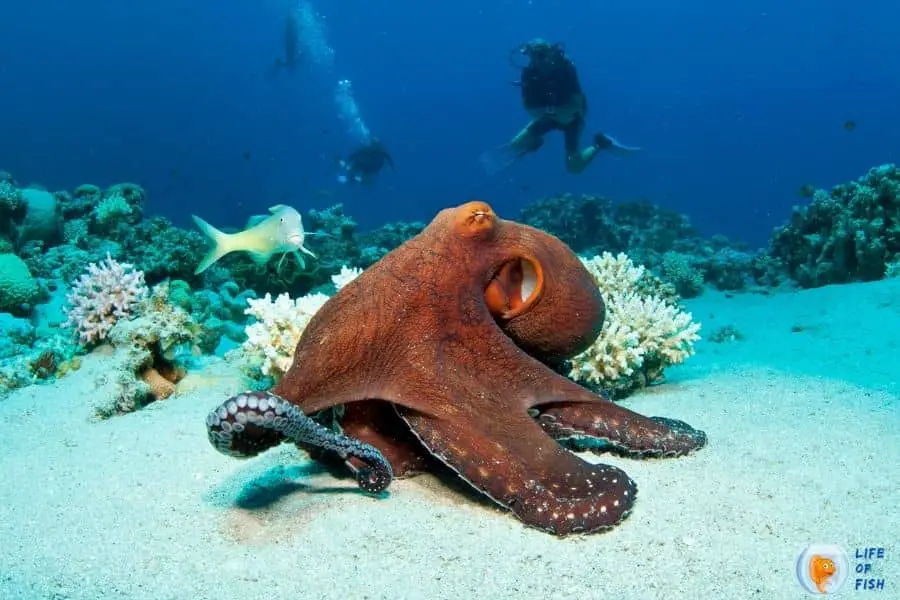
Can octopus crawl on land?
Yes. Octopuses have three hearts inside their mantle. Two of these three hearts are dedicated to pump blood to the gills.
Hence, this animal depends on the gills for oxygenated blood supply. The third heart keeps circulation flowing to the organs.
When an octopus swims, this heart stops beating, causing the animal to suffocate. Therefore, octopuses prefer to crawl rather than swim.
Can octopuses walk on land?
Yes. Octopuses near the shore often walk (actually creep) on land when searching for food among rock pools or if they are trapped in a low tide.
So, if you see an octopus eats and walking on the ground, don’t be surprised from now on. Please do not go near the animal as it may frighten it.
Let it go to the nearest pool. If you think they are suffocating, never attempt to help the animal as it may be sick or injured. Instead, call Marine life rescue in your area to get help.
Can octopuses feel pain?
Certainly, octopuses are one of the most neurologically complex invertebrates in the ocean.
So, they are entirely different from other invertebrate types. According to a study by Neurobiologist Robyn Crook from San Francisco State University, octopuses feel pain, both physically and emotionally, like mammals.
Although their nervous system is organized differently from mammals (vertebrates), they show spontaneous pain-associated behaviors like us.
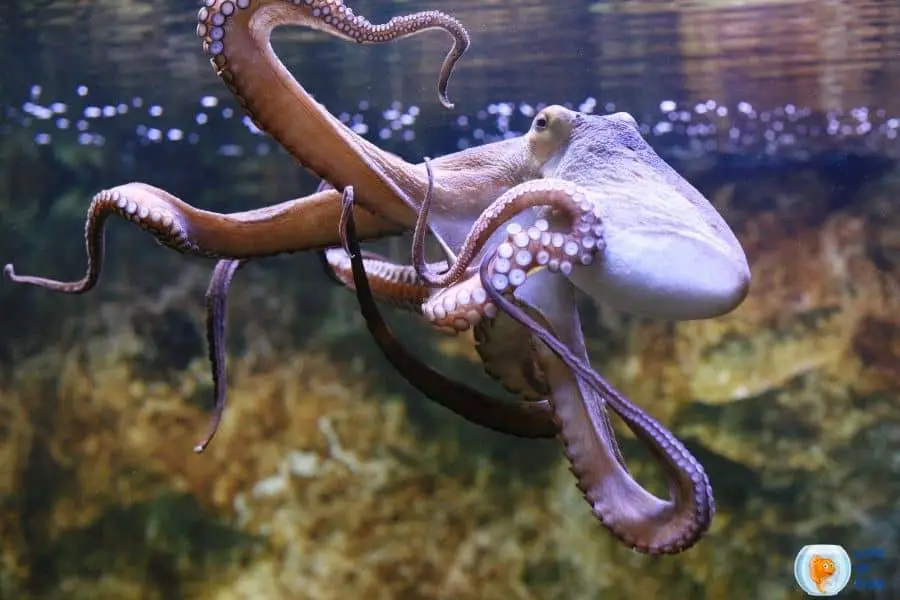
Can an octopus bite your finger off?
Yes. Although octopuses are generally not aggressive toward people; they can bite your finger off.
Octopus’ beak-like mouth is made of chitin, a strong and hard substance that helps them consume arthropods such as crustaceans.
Their beak is like a parrot beak that can drill a hole in their prey like crabs, snails, and other mollusks to inject venomous saliva into the prey to paralyze it.
If an octopus bites you, it will cause severe damage with heavy bleeding.
There is actually only one informed case of octopus bites, and it caused an intense injury on the victim’s face.
A woman in Washington once placed an octopus on her face to take a photo, and it bit her chin, causing severe bleeding.
Other than that, there are no known cases of octopi biting humans as these are shy creatures.
However, their beak is so much capable of harming human skin. Therefore, it is better to appreciate these creatures from a distance.
Can octopuses eat humans?
There are one species that can actually eat us. The giant pacific octopus is considered the largest octopus in the world.
Although the average length of this creature is about 16 feet, it may grow up to 30 feet with an average weight of 110lbs.
The highest recorded weight is 600lbs. These creatures can easily attack an average-sized human if they choose to.
Fortunately, most species of octopi are known to be rather shy and friendly towards people and usually do not harm any creatures of similar size.
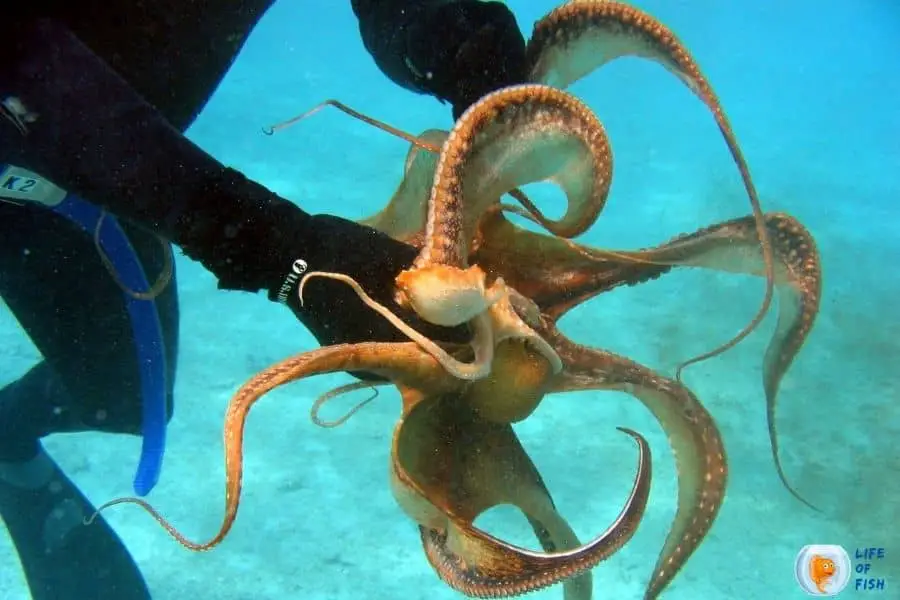
Is octopus intelligent?
Octopuses actually meet all of the criteria for intelligence.
They can open jars from inside and outside, open waterproof boxes of underwater cameras, and even easily escape their tanks through the smallest openings.
But those are not good examples to prove their intelligence. Would you believe that an octopus can make an L-shaped object fits through a small square opening in a wall?
Octopuses are also better in discriminative learning. When confronted by two objects, octopuses learn to attack only one object in exchange for a reward, and they can retain this information for several months.
They can also spontaneously apply a rule that is previously learned to new objects. For example, octopuses who had previously learned to attack a real ball can after attack a virtual ball on a screen.
Octopuses also use conditional discrimination, which means they can change their choice depending on the situation.
They can, for example, learn to attack an object exclusively in the presence of bubbles. They also have an excellent memory.
Octopuses can find a hidden shelter by memorizing its location or utilize visual cues to determine how to put their arm inside an opaque T-shaped device.
A surprising fact is that octopuses can also learn by watching other octopuses carry out tasks.
Octopuses are usually solitary creatures and do not interact with other octopuses. But, they are smart enough to imitate the choices of their own species, which, as we think, is incredible.
Are octopuses poisonous to humans?
According to a new study, all octopuses are venomous.
All octopus bites can cause bleeding and swelling in people because all octopus species contain venom.
However, a few octopus species are known to be fatally dangerous. One such species is the blue-ringed octopus.
Actually, the poison of one grown blue-ringed octopus can kill ten grown men by causing respiratory arrest.
The venom of the blue-ringed octopus comprises the neurotoxin tetrodotoxin, which paralyzes the victim.
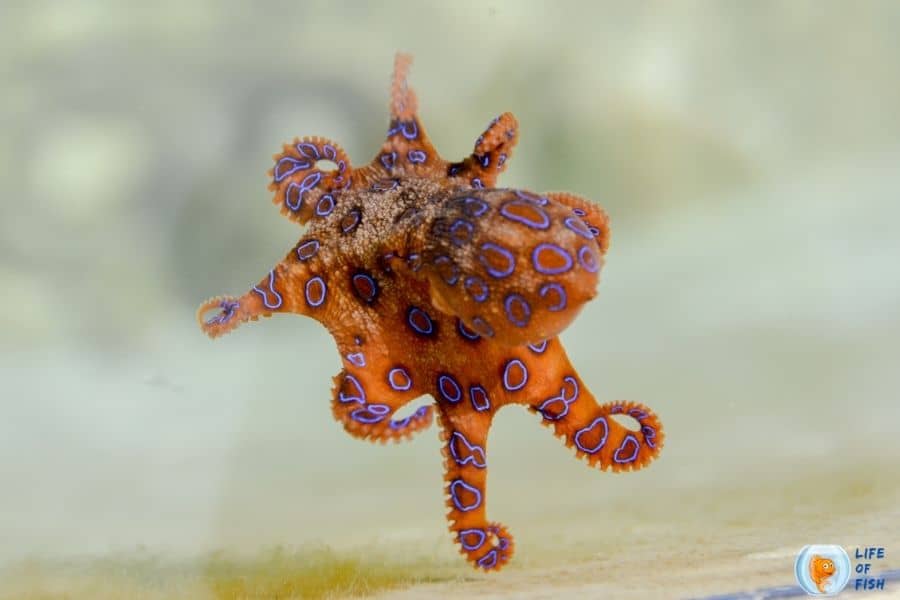
Is it safe to touch an octopus?
Although octopuses are formidable fighters in the wild, they usually are not dangerous to humans.
They are generally friendly towards us if they are not disturbed. But, these creatures have several defensive mechanisms that can cause harm, even kill people.
For example, they have hard, sharp beaks that can pierce the flesh and shells of their prey and enemies, and they have venoms that can actually harm us to some extent.
So, we can assume that it is not safe to touch an octopus if you are not experienced in handling octopuses.
Read More: Are There Freshwater Jellyfish ? 10 Amazing Facts
Related Questions
How does octopus reproduce?
Reproducing is a death sentence for both male and female octopuses as both sexes die after reproduction.
When octopuses breeding, the male mount the female with his specialized arm called a hectocotylus.
Then he transfers spermatophores (packets of sperm) into the female’s mantle cavity. The eggs fertilize inside this mantle cavity.
The female octopus attaches strings of small fertilized eggs into rocks, empty mollusk shells, or man-made objects such as cans, bottles, tires, tins, boots, and amphorae.
Then she guards and cares for them for about 5 to 10 months, not consuming any food.
Soon after the octopus eggs hatch, the female dies after losing one-third of her pre-spawning weight.
On the other hand, the male animal dies few weeks after mating because of biologically aging.
How long do octopuses live?
Octopuses life expectancy is relatively short. Most smaller octopuses live for about six months maximum, while the giant pacific octopus lives for five years.
This, of course, if the octopus doesn’t reproduce. If reproduction happens, both male and female species die, the male from becoming senescent after a few weeks and female after the eggs hatch by starving to protect her eggs.
This short life expectancy occurs naturally to limit the rapid overpopulation of these species.
How smart are octopuses?
According to some measures, octopuses intelligence is somewhat closer to a dog’s.
As these are invertebrates, we can never compare their intelligence with a mammal, specifically humans.
But we surely tell this, that octopuses are the most intelligent invertebrates in the world.
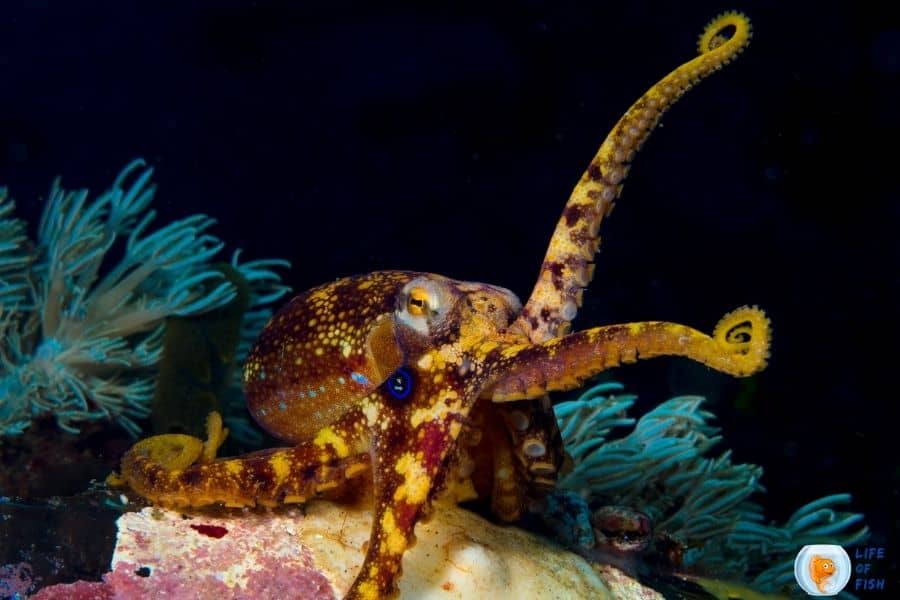
Why do octopuses have nine brains?
Octopuses are believed to have nine brains. It is said that an octopus has one central brain and eight mini-brains on each of 8 arms to allow each arm to act independently.
While it is true that their arms are very clever, the thought of nine brains is actually not true.
According to a study, octopuses actually have a centralized brain with a very complicated nervous system.
Its arms share information through this nervous system and behave according to information flowing through the central brain.
So, each arm of this animal thinks and responds differently. However, there are still things on the grey side with so many questions.
Can octopuses regrow limbs?
Yes. Octopuses can regrow their limbs (arms). In severe damages, where this animal may die, it can not regrow like the starfish.
But when only an arm is damaged, it can regenerate it. When an arm is damaged, its undifferentiated stem cells develop into specialized cells, such as the muscle and nerve cells, to a new arm.
These regenerated arms are fully functional and better performing than the original arms. However, it takes around 100 to 130 days to develop a new arm fully.
Why does an octopus have blue blood?
Octopus has blue blood to keep them alive in freezing temperatures.
These marine species often live under the deep sea, where the average temperature is around 4°C.
So, if they have to survive, they have to cope with this temperature. Blue blood contains a protein called hemocyanin that contains copper rather than iron in hemoglobin.
This copper-based protein can efficiently transport more oxygen throughout the octopuses body in cold and low-oxygen conditions.
If this blue blood becomes deoxygenated, in other words, the octopus dies, it turns clear instead.
Conclusion
Now you know octopus breathe air like many other living organisms. But the difference is they need more air to breathe as they have more than one heart.
Although octopus breathe air, they can not survive without water. Water is an important fact fr their survival.
So I hope you found what you looked for in this article. Let us know if you have any comments or criticisms.
Read Next: Beginners Guide To Porgy Fishing | With Super Interesting Facts|
